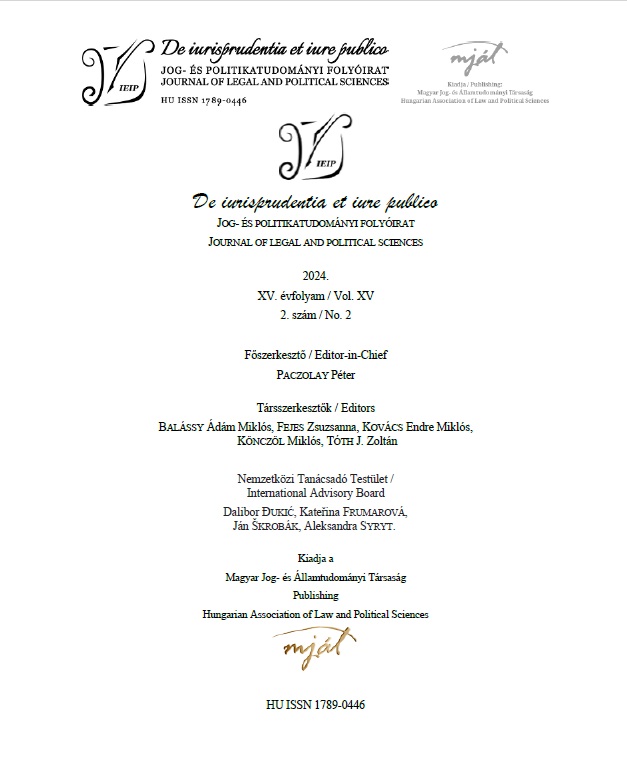DIEIP 2024. XV. évfolyam / Vol. XV. 2. szám / No. 2.
Articles
2021. április 6. reggele. „Szól a telefon, fáj a hír” (ahogy József Attila írta Juhász Gyula halálára), hogy elhunyt Mészáros Ádám, a hazai büntetőjog-tudomány (amin mindig vitatkoztunk, hogy a „büntető jogtudomány”, avagy a „büntetőjog-tudomány” a helyesebb megnevezés) kiemelkedő, s megkockáztatható, hogy legeredetibb alakja. […]
Abstract
The legal regulation of joint offenders dates back to the first Hungarian Criminal Code, which also implies that the judicial practice of this legal institution has a history of several decades and that there are few unclear questions of interpretation that could raise problems in practice. This paper deals with one such issue, which has apparently been settled for decades, namely the legal assessment of the involvement of children and persons with mental disorders in the perpetration of a crime as joint offenders. In addition to presenting the taxonomic position of infancy and mental disorder in the broader criminal law context, this paper seeks to highlight the contradictions of the legal interpretation regarding these two categories of persons by contrasting the judicial practice of different legal instruments. As well as outlining the problems, the paper also presents an alternative solution that could help to resolve these contradictions.
Keywords: perpetrators, joint offenders, infancy, mental disorder, judicial practice
Abstract
The central theme of the thesis is the question of the practical applicability of the short statutory regulation of overstepping. The problems associated with the application of overstepping are most often found in the context of incitement, and the paper focuses specifically on this to answer these dogmatic questions, because if dogmatic solutions can be found, they can be applied to deal with different forms of perpetration. The basis of the research is that the regulation of overstepping has not changed at all with the entry into force of the new Penal Code, nor does it show any significant difference from the previous legislation. This in itself indicates that while most areas of the law have evolved and have been refined to adapt to the changing world, issues of overstepping have escaped the attention of the legislator. My research question, therefore, is what causes the fossilisation of regulation: Are the different rules of overstepping actually well applied in practice, or has it simply fallen out of the horizon of jurisprudence?
Keywords: Overstepping, incitement, perpetration
Abstract
The accurate differentiation between the categories of perpetrators not only gives rise to significant questions pertaining to the fundamental tenets of criminal law theory, but can also have numerous substantive and procedural consequences, which inevitably arise in practice. Furthermore, it is of particular importance to identify the appropriate category and to accurately classify the conduct of the perpetrator(s), as this is the foundation for determining whether the given act falls within the legal unit of the offence of budgetary fraud.
Thus, in my study I examine and present the main features of being accomplice to a criminal offence from the perspective of criminal law dogmatics, and the aspects of its differentiation from the quality of being a principal, a coactor and a covert offender. Subsequently, this article discusses the relationship between the categories of perpetrators and the cumulative qualification, and also briefly addresses the subjective factors of the issue, which are perhaps the most fundamental and uncertain variables in this matter.
Keywords: Criminal law dogmatics, perpetrators, accomplices, covert offenders, budgetary fraud
Abstract
From a historical point of view, the study of the scientific and legal concept of ‘crime’ usually goes back to the late modern era.
Although the so-called traditional Hungarian law of the Middle Ages and early modern times was basically not focused on dogmatics and the creation of definitions, the appearance of the basic institutions of criminal law, thus some kind of definition and identification of ‘crime’, can already be observed at that time.
Since this definition was rooted in practice, and the law of that time was basically a practical law seeking practical solutions, the definition of crime of the era can best be called a ‘practical crime concept’.
However, this practical concept was further developed by the developing Hungarian criminal law science of the middle of the 18th century, and then the first domestic codification attempts also built on it.
Keywords: traditional law, criminal law, dogmatics, practice, crime
Abstract
In domestic legal literature, a lot of discussion revolves around the legal institution of justifiable defence, resulting in a highly detailed and developed system. In contrast, the right to capture a perpetrator caught in the act (citizen’s arrest) has been addressed by the legislature with only a single brief provision. This rule is regulated by the Hungarian Code of Criminal Procedure. The issue is that, in the absence of detailed regulation, the burden falls on the courts to assume legislative tasks through specific cases. This raises serious constitutional and, consequently, legality concerns. This study aims to highlight these emerging issues and find solutions.
Keywords: justifiable defence, citizen’s arrest, criminal procedure, legality, fundamental rights

